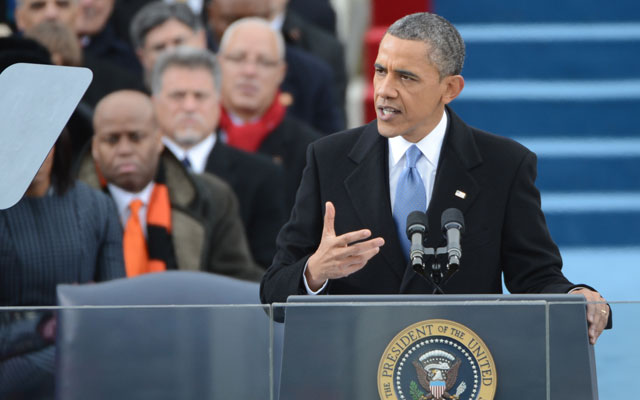Obama to Lead on Climate Change, but Only Through Back Door
Nicolas Loris /
During his 2013 inaugural address, President Obama told Americans that the United States “will respond to the threat of climate change” and will take the lead for other countries to follow suit.
This commitment is a willful rejection of reality. Congress has been unwilling to enact legislation to unilaterally address climate change. Multilateral attempts become more futile each year as other major countries, especially developing ones like China and India, refuse to play ball. This leaves the President with the sole option of pursuing costly regulatory actions to unilaterally reduce U.S. greenhouse gas emissions that, ultimately, are pointless in that they would not resolve the issue—to the extent that this is an issue at all.
And why should developing countries curb their economic growth to reduce greenhouse gas emissions, especially when large percentages of their populations are without access to electricity? When discussing the economic sacrifices Americans and citizens in other countries would have to make to reduce carbon emissions, it’s important to put the threat of climate change under the microscope.
Accepting the fact that the earth is warming and that carbon dioxide and other greenhouse gas emissions are a warming agent does not mean the following are true:
1) Manmade emissions are driving climate change and are a pollutant that needs to be regulated.
Even though greenhouse gas emissions are a warming agent, that doesn’t even come close to settling the scientific debate about climate change and climate sensitivity—the amount of warming projected from increased greenhouse gas emissions. Consideration of manmade carbon dioxide as a negative externality also ignores a plethora of peer-reviewed literature that explains the benefits of more CO2 in our atmosphere (e.g., plant growth, human longevity, seed enrichment, and less soil erosion as a result of more robust tree root growth).
2) The earth is cooking at a catastrophic rate.
Although the media paid much attention to the National Oceanic and Atmospheric Administration’s (NOAA) recent report showing 2012 to be the warmest on record for the continental United States, the media largely failed to report that it was only the ninth-warmest year globally in the past 34 years (the period for accurate data). In fact, average global temperatures have leveled off over the past decade and a half.
3) Sea levels will rise dramatically, threatening America’s coastlines.
Even the Intergovernmental Panel on Climate Change (IPCC) report, which proponents of CO2 reduction consider the magnum opus, projects sea level rising over the next century a modest 7 to 23 inches, with the lower end of that projection occurring over the past two centuries.
4) There will be more extreme droughts, heat waves, hurricanes, and other natural disasters.
University of Alabama climatologist John R. Christy, PhD, provides convincing arguments that natural disasters (They’re called natural for a reason, right?) will occur with or without increased manmade emissions.
Despite all of that, President Obama is adamant to pursue unilateral and multilateral efforts to reduce carbon dioxide. The past four years have seen successive annual United Nations conferences (Copenhagen in 2009, Cancun in 2010, Durban in 2011, and Doha this year) frantically trying to reach agreement among nearly 200 countries on a successor to the Kyoto Protocol.
The problem is that the basic approach is unworkable. International negotiations have centered on placing the economic burden of addressing climate change on a few dozen countries while asking nothing from more than 150 developing countries. But the primary source of greenhouse gas emissions is increasingly the developing world. If the problem is increasing emissions of greenhouse gases, no solution can be reached without capturing all sources, including developing countries.
Even though legislative attempts to reduce greenhouse gas emissions have repeatedly failed, the Obama Administration appears bent on traveling this self-defeating path. The Environmental Protection Agency (EPA), the Department of Interior, and the Department of Labor are all promulgating stringent emission standards for new power plants that would effectively prohibit construction of new coal-fired electricity generating capacity unless it is equipped with carbon-capture technology—a prohibitively costly technological requirement. The EPA has also introduced costly new air quality standards for hydraulically fractured wells and new fuel efficiency standards that will raise the cost of cars and light-duty trucks, not to mention make them smaller and less safe.
Restricting greenhouse gas emissions, whether unilaterally or multilaterally, will result in significant economic costs for the U.S. economy. This is a serious decision with grave consequences, and Congress needs to step up to prevent these costly, ineffective backdoor policies. Further, the U.S. must not unilaterally assume these burdens as a symbolic gesture hoping that other countries might emulate our example—repeated U.N. negotiations demonstrate the small likelihood of that outcome.
President Obama should respond to the threat of climate change by acknowledging that the severity of the threat is low and the costs of action are painfully high and won’t make a dent in the earth’s temperature.

